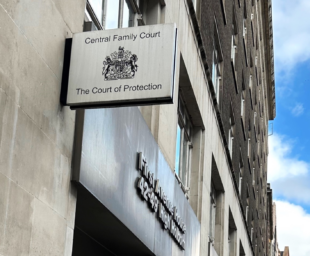I’ve been working at the Court of Protection for 19 years and feel privileged to work with judges who make important decisions about financial and welfare issues for vulnerable people in our communities. It’s a court that people are not usually aware of until they, or someone they know, needs support.
The work of the Court of Protection
The Court of Protection makes decisions for people who lack the mental capacity. to make decisions on their own. This can happen for lots of reasons, for example, they may have a serious brain injury, an illness like dementia or severe learning disabilities.
For people who lack mental capacity the court can step in to:
- decide whether someone has the ability to make a particular decision for themselves
- appoint a deputy, who can make decisions on financial issues like paying bills or welfare matters such as making care provisions
- give permission for a one-off decision on behalf of someone who lacks mental capacity
- handle urgent or emergency applications, for example when there’s a medical emergency and a decision must be made without delay
- make decisions relating to a lasting power of attorney or enduring power of attorney
- decide whether someone can be deprived of their liberty under the Mental Capacity Act
A person’s ability to make decisions for themselves can be intermittent due to their mental health or they may regain capacity following an illness, for example, after suffering a severe stroke.
People come to us in a variety of circumstances, but what does not change is our commitment to make sure the individual is at the centre of the decision-making process.
Taking important decisions
A variety of people can apply to the Court of Protection when they believe someone lacks mental capacity. Relatives, friends and even local authorities make applications for property and affairs deputyships and the role of the court is to decide whether that will be in the best interests of the individual. Decisions made by the courts can have serious implications so applications are always considered carefully, and the court never loses sight of the fact that a real person will be impacted by the outcome.
Improving the Court of Protection
In the Court of Protection, no two days are the same. The court can be asked to consider making an urgent medical decision within a couple of hours, so it’s important we look at how we work to ensure we’re helping people in the most appropriate way.
We’re modernising the court to make it easier for people to apply online. We’re also updating processes and asking users applying to the court for a financial deputyship to organise the required notifications. By doing this, interested parties like doctors, relatives, social workers etc can provide comments which are submitted with the application. That helps the judge making the decision by giving them more information at the start of the application process, enabling them to make the right decision quickly.
Finding more information
We can all find ourselves in a position where a neighbour, relative or friend needs help to make important choices and we understand that applying to the Court of Protection could feel intimidating. I’ve been working at the court for many years and my team is passionate about helping people. You do not have to be a legal professional to apply to the court, so if you’re concerned about a person and want to find out more, take a look at the Court of Protection website.


5 comments
Comment by Nikki Ridler posted on
Accessibility and Reasonable Adjustments for hidden disabilities, visual impairments and partially blind also the deaf individuals that attend protection court, Would the application form process be simplified and accessible to read and for the individual to fill out.
Questions on the form to be simplified and to understand for the individual, to have an independent person to fill out if the person can not read or write. Also in braille too.
Question - if a individual can't use a computer or laptop how does the individual obtain an application form online.
Comment by ljones1 posted on
Thank you for your comment, we are able to provide accessible versions of the Court of Protection forms. Please contact the court on 0300 456 4600 and our staff will be able to help.
Comment by Euphemia Yaidoo posted on
Kindly give me the name of the person I can contact to lodge a complaint against the Manchester Court of Protection for issuing bogus orders. I have tried to resolve this matter all to no avail. After putting an online complaint, I went in personally and delivered a complaint but have got no redress from the matter.
Comment by Aaron Wilson posted on
Hello, thanks for your comment. If you'd like to make a formal complaint about the service you've received, please use our <a href="https://hmcts-complaint-form-eng.form.service.justice.gov.uk/">online form</a>. The team will aim to respond within 10 working days. We hope this helps.
Comment by Euphemia Yaidoo posted on
I wish to say thank you very much for responding to my query. I will see if this time I will get a reply to my complaint. Thank you all the same for your assistance.